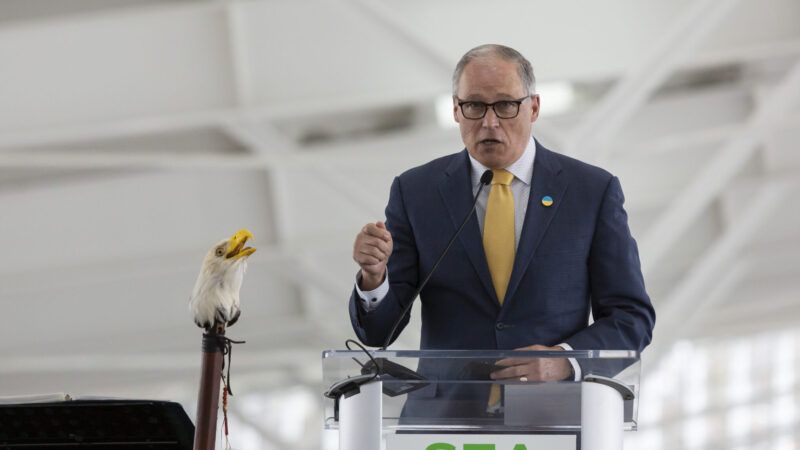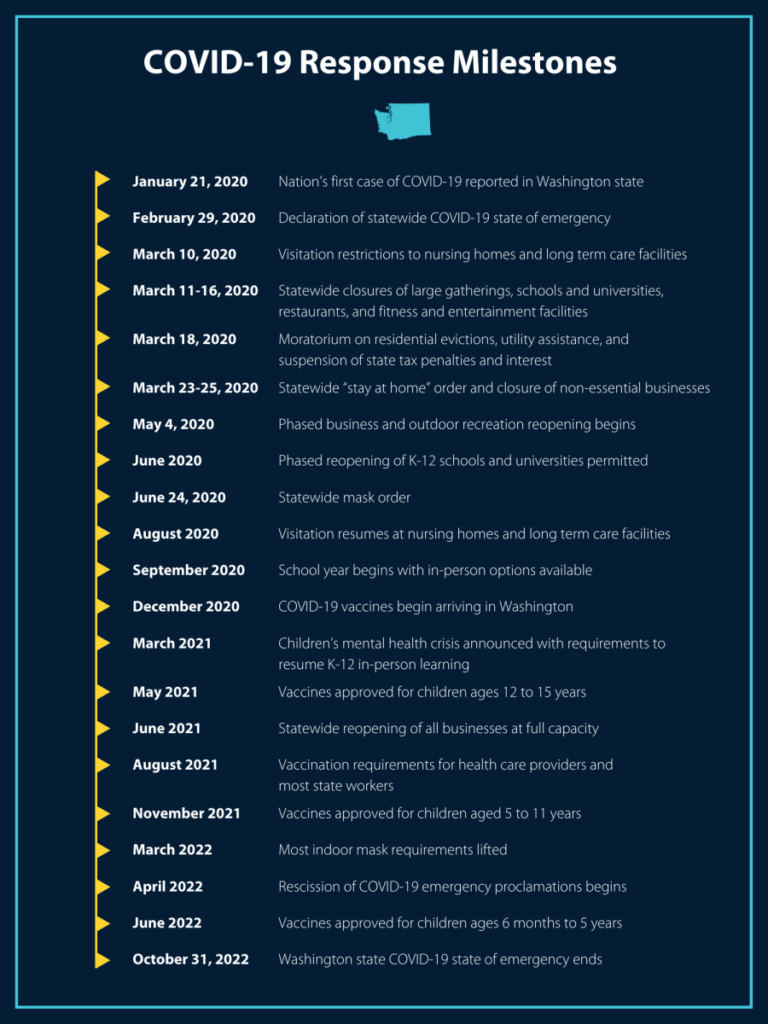After 975 Days, Washington's Governor Will Finally Relinquish His Emergency Pandemic Powers
Gov. Jay Inslee says Washington state's COVID-19 emergency will finally come to an end on October 31.

For most Americans, COVID-19 long ago stopped being an immediate crisis and has become little more than a dull annoyance, a mundane part of everyday life to be ignored when possible and dealt with when necessary.
In Washington state, however, the pandemic will continue to be a literal emergency—for at least another seven weeks.
Gov. Jay Inslee announced Thursday that he will end the state's COVID emergency declarations on October 31—a mere 975 days after the first emergency order was implemented on February 29, 2020. In the announcement, Inslee conceded that "we've come a long way in the past two years in developing the tools that allow us to adapt and live with COVID-19," and admitted that the world has entered a new "era" of dealing with the disease.
Over the past two-and-a-half years, few governors have exercised as much broad, unchecked power over schools, the economy, and individuals' decisions as Inslee. According to the Seattle Times, the governor issued 85 emergency orders during the pandemic, 23 of which are still in effect. Inslee's word was law when it came to everything from shutting down schools to banning evictions, from mandating masks in various settings to mandating vaccines for certain professions, and from ordering businesses to close to deciding when they could reopen.

And it's probably safe to say that no governor has had a more self-aggrandizing perception of his emergency powers. "There is only one person in the state of Washington who has the capability to save those lives right now, and it happens to be the governor of the state of Washington," Inslee told a local TV station during an interview in October 2021—more than 18 months into the emergency and well after vaccines were readily available to all who wanted them.
Asked by the interviewer whether legislators should play a larger role in making policies like vaccine mandates, Inslee said it wasn't possible "because we need to act right now." Asked when the crisis might be deemed to have passed, at least to the extent that would allow lawmakers into the process, Inslee said he couldn't be sure "because there are so many metrics to look at."
Indeed, governing is a complex process. And there are situations where it is necessary to have one person exercise unilateral authority because an emergency does not permit time for democratic deliberations. But while that argument may have held water during the spring of 2020, it certainly did not in October 2021—to say nothing of October 2022. An emergency that lasts for 900-plus days is not, by definition, an emergency.
As I wrote in the February issue of Reason, broad and ill-defined emergency powers laws exist in most states but, until the COVID-19 pandemic, they were mostly used for acute emergencies like severe storms, earthquakes, bridge collapses, terrorist attacks, and the like. Those are emergencies in the true sense of the term: limited events for which it makes sense to short-circuit the usual governing process so an immediate response can be directed by the chief executive.
"Certainly, while initial executive response to emergencies should be robust and unhindered by the burden of administrative or legislative oversight, this should not be the case over a longer period of time," wrote state Judge Bernard Veljacic in an opinion dissenting with the state of Washington's Court of Appeals' decision in August to uphold Inslee's indoor mask mandate. "Of course, in the early days of an emergency, Washingtonians would suffer if required to wait on the executive to set a legislative session, assemble the necessary quorum, and oversee a vote on a course of action. But at some point, over the long term, an emergency grows less emergent. After all, time allows for the opportunity to reflect. That same opportunity should include legislative review."
But the Democrat-controlled state Legislature showed little interest in reining in Inslee, even as most other states ended emergency orders and some rolled back the statutes allowing governors to seize such broad powers in the first place.
Jason Mercier, director of the Center for Government Reform at the Washington Policy Center, a free market nonprofit based in Seattle, says the Legislature should pass a law that would have emergency declarations expire after 30 days unless lawmakers vote to continue them.
"Requiring affirmative legislative approval after a set point in time removes not a single tool from the Governor's toolbox," Mercier wrote in an email to Reason. "Whether or not you agree or disagree with every decision the Governor has made for the last 900-plus days, the fact remains these decisions with vast impact on individuals and businesses were made behind closed doors in the executive branch."
In fairness, Washington state is not the last place where pandemic emergency powers are being wielded. According to the National Academy for State Health Policy, there are 13 other states where emergency declarations are still in force. Kansas' emergency order is not set to end until January 2023, while California's is open-ended and will continue until Gov. Gavin Newsom (or a successor) decides to end it.
In light of that, Inslee deserves a small bit of credit for voluntarily relinquishing his pandemic-era powers.
But that he held onto them for so long demonstrates some serious problems. It's an indictment of Inslee's sense of judgment and leadership skills, and it should be a warning to lawmakers that the laws governing Washington state's emergency executive powers need pruning.


Show Comments (102)